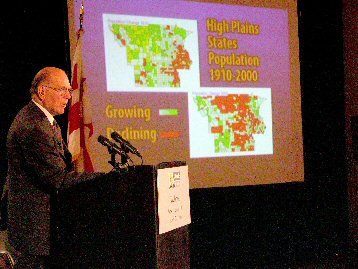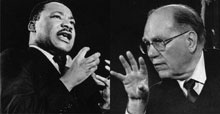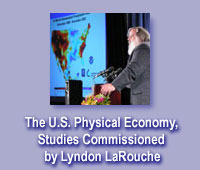|
...... ...................
|
Published: Tuesday, Apr. 12, 2005
Today is:
|
|
Volume 4, Issue Number 15
|
|
|
|
|
|
|
|
|
|
|
|
|
|
|

Photo Credit: EIRNS
|
|
Here is the transcript Lyndon LaRouche's opening statement to an April 7 webcast, sponsored by the LaRouche Political Action Committee, in Washington, D.C. The webcast was broadcast live into the annex building of the Argentine Congress, among other international locations. Moderator Debra Hanania-Freeman announced the vote in the Italian Chamber of Deputies for a motion to convoke a New Bretton Woods conference to reform the international financial-monetary system, a proposal which LaRouche had crafted.
|
|
We're in a situation, to situate what I'm to say today, in which there are an increasing number of influential circles around the world, including inside the United States, which are now echoing something that President Clinton said in September of 1998, in the aftermath of the collapse of the Russian bond speculation: That the world needs a new financial architecture to replace that of the present IMF system.
And around the world today, as typified by the events yesterday in the Italian Parliament, where what had been worked out with me was voted up by the Parliament, in a very heated but spirited debate, is now on the minds of people around the world: We need a new financial architecture for the systems of the world. We can not continue under the present one. What is undecided in the minds of many, is what that architecture should be. Many have opinions, more or less superficial in many cases. But there is no consensus, at present, on what has to be done.
...more ...................................pdf format
|
|
CURRENT SUBSCRIBERS:
LOG IN HERE, OR USE THE LINKS BELOW, TO ACCESS THIS ISSUE.
|
|
|
Latest From LaRouche
Here are selections from the Question-and-Answer period, following Lyndon LaRouche's opening remarks to an international webcast, April 7 (see Indepth Feature this week).
Question (submitted by a Democratic consultant in Washington, who has been heavily involved in the fight to save Social Security): Lyn, my question to you is perhaps an obvious one, and to be honest, I've gotten the answer delivered at various volume levels by those who speak for you at various points.
But, I think it would probably be useful to put the question to you personally, especially before this broad public audience. You've repeatedly asserted the need for the convening of a meeting similar to FDR's 1944 Bretton Woods conference, in order to craft a new financial architecture to replace the current one, which seems to have ceased functioning. But the bottom line is this: I can't think of any collection of scoundrels among those alive today, who would be more hostile to this idea than those who are roughly referred to as the Bush Administration.
But, the problem that we face, is that it seems that this issue just is not going to wait for four years. So, how do you proceed with a Presidency, that is so hostile to the principle that you're expounding? LaRouche: Ah-ha-ha-ha! That's a nice question! I like that.
|
This Week in History
April 11 - 17, 1945
Remembering FDR on the 60th Anniversary of his Death: — How He Kept a Roof Over Our Heads
It is sometimes difficult, 60 years after the death of Franklin Delano Roosevelt on April 12, 1945, to comprehend how much he did to create the structure of modern American life. Many things that we take for granted did not exist before his Presidency, or were hopelessly inadequate. One of the programs which reflects his philosophical outlook and its implementation in economic practice is his effort to stop the escalating home foreclosures during the Great Depression.
Most everyone has seen the well-known image from America's early silent films, where the evil villain, stroking his mustache, tries to foreclose on an overdue mortgage and throw the elderly widow out on the street. This was not a Hollywood invention—it was a painfully familiar scene to Americans during the decades before Roosevelt's election. Any citizen of average means who tried to buy a home before 1933 faced interest rates between 6-8%, but could only obtain a mortgage for a term of three to five years. Often the first mortgage could not cover the purchase, and so a second mortgage had to be obtained, and this at rates up to 10%, and for a shorter term than the first.
Complete payment of any mortgage was almost an impossibility, because there was no plan of amortization and therefore a large lump sum became due after just a few years. When the mortgage matured, the "homeowner" had little choice between being foreclosed on, or refinancing by paying exorbitant extra charges and continuing payments which rarely decreased any of the principal because they were always paying off the interest.
Two examples will suffice to make the picture clear. The heirs of an estate in Pennsylvania paid off a $2,500 mortgage which had been placed on a farm in 1868, and they discovered that more than $10,000 had already been paid in interest without reducing the principal. Another family paid $2,520 in interest on a $2,000 mortgage over a period of 21 years without any reduction of the principal at all.
Then the Great Depression hit in November of 1929, and foreclosures escalated at a cruel rate. President Roosevelt wrote, in 1938, that, "One of the major disasters of the continued depression was the loss of hundreds of thousands of homes each year by foreclosure. The annual average loss of urban homes by foreclosure in the United States in normal times was 78,000. By 1932 this had increased over three and a half times, to 273,000. By the middle of 1933, foreclosures had advanced to a total of more than 1,000 per day. Not only did this cause the obvious hardship of loss of homes, but it froze and endangered the assets of the various mortgagees—insurance companies, mortgage banks, savings banks, savings and loan associations, and other financial institutions, which held the savings of over 30,000,000 of our people."
With conditions constantly worsening, President Roosevelt sent a message to Congress on April 13, 1933, asking for legislation to "protect small home owners from foreclosure and to relieve them of a portion of the burden of excessive interest and principal payments incurred during the period of higher values and higher earning power.
"Implicit in the legislation which I am suggesting to you is a declaration of national policy. This policy is that the broad interests of the Nation require that special safeguards should be thrown around home ownership as a guarantee of social and economic stability, and that to protect home owners from inequitable enforced liquidation, in a time of general distress, is a proper concern of the Government."
By June 13, Roosevelt was signing the Home Owners Loan Corporation (HOLC) Act, which created many of the safeguards and standards with which we are familiar today. The Corporation was capitalized with a $200 million subscription by the U.S. Treasury to its stock, and was authorized to issue bonds to the total amount of $2 billion, in exchange for first mortgages on urban homes. Further increases in the amount of dollar authorizations provided funds for the repair and reconditioning of homes. To stabilize the institutions which granted the mortgages, a provision of the act stated that $300 million could be invested in those institutions or in the bonds, debentures, or notes of Federal Home Loan Banks.
As President Roosevelt wrote: "What the Corporation did to accomplish its emergency task was to buy the mortgages of distressed home owners from those institutions and individuals who held them and were unwilling or unable to grant further extensions and concessions to the mortgagor.
"A large proportion of these mortgages were written on a short-term basis for one, two, or five years; and when the Corporation assumed them, many were subject to steadily accumulating delinquencies.... Interest rates on both short-term and long-term loans were high, and great numbers of them were weighted with premiums, commissions, service charges, and extra fees of various kinds which added to the load borne by the borrower.
...more
|
|
Feature:
Italian Parliament Endorses Call for New Monetary System
by Claudio Celani
In an historic breakthrough, on April 6 the Italian Chamber of Deputies (the lower House of Parliament), approved a motion calling on the government to promote 'an international conference at the level of Heads of State and Government, to globally define a new and more just monetary and financial system.' The motion had been drafted by Paolo Raimondi, representative of the LaRouche movement in Italy, together with Rep. Mario Lettieri, who had introduced it with fifty colleagues from almost all Italy's political parties. It is a faithful representation of both the analyses and proposals put forward by American economist and political leader Lyndon LaRouche, to whom legislators supporting the motion repeatedly referred as the initiator of the campaign 'for a new Bretton Woods,' during the Parliamentary debate.
South American Summit: Infrastructure Integration Is the New Name of Peace
by Dennis Small
It was a scene that many would have considered next to impossible, only weeks before it happened. But there they were: the Presidents of Brazil, Colombia, Venezuela, and Spain, gathered on March 29 in the Venezuelan city of Ciudad Guayana, discussing the details of regional great infrastructure projects to pull their economies out of poverty, and to lay the foundations of lasting, regional peace.
UN Reports on Rise in Tuberculosis in Africa
by Leni Rubinstein
A recently released report from the UN World Health Organization (WHO), 'The Global Tuberculosis Control Study for 2005,' reveals that tuberculosis has reached alarming proportions in Africa, with a growing number ofTBcases and deaths linked to HIV. One of the Millennium Development Goals (MDG) to achieve by 2015, is to halt and begin to reverse the spread of TB, as one of the world's major diseases. In a message to the UN's World TB Day in late March, Secretary General Kofi Annan said in a message, that much harder work is needed to halt a scourge 'both preventable and curable.'
In Memoriam:
REVIEW OF 'MEMORY AND IDENTITY'
In Defense of Christianity
by Lyndon H.LaRouche, Jr.
Memory and Identity: Conversations at the Dawn of a Millennium New York: Rizzoli International Publications, 2005 192 pages, hardcover, $19.95
April 2, 2005
About an hour ago, I received a terse report that Pope John Paul II had died. Some days ago, after I had begun the writing of a review of the English edition of the book Memory and Identity, I haltedmycompletion of the review out of a saddening sense that these might prove to be the last days of his mortal life. In a manner of speaking, I paused to give this Pope the last word. Nonetheless, I have changed nothing of what I had begun to write, except to situate that in an appropriate way as my personal expression of regard for my own mourning and others', for our common loss. Even then, as the present title I had already given to this review attests, when I had still hoped for some degree of his recovery to continue his work, the intent of my review was to have been a relevant reflection for today of what this Pope's ministry has meant for the continuity of the apostolic legacy of the Christian Church up through his ministry, to beyond his now-reported passing.
- International Tributes
From the vast world outpouring of tributes, we select a few that are especially significant...
International:
How Wolfowitz and the Neo-Cons Sabotaged the First 'Oasis Plan'
by Dean Andromidas
The only hope for Southwest Asia and an Israel-Palestine peace agreement, is the implementation of Lyndon H. LaRouche's 'Oasis Plan,' where a Middle East peace can be organized around cooperation for regional economic development. Such a plan would necessarily involve the construction of nuclear-powered desalination plants and other infrastructure throughout the region, enabling an exponential increase in the water supply to 'make the deserts bloom.'
The recent appointment of outgoing U.S. Deputy Secretary of Defense Paul Wolfowitz, one of the leading 'children of Satan' of the Bush Administration, to the chairmanship of the World Bank, is aimed at sabotaging the LaRouche policy.
Chinese Patriots Move To Defuse Ignitition of a Cross-Strait Crisis
by Leni Rubinstein
The Cheney-Bush Administration's so-called preventive war doctrine, combined with the underlying collapse of the international financial system, are dangerously escalating the danger of a U.S. confrontation with China. Taiwan, for quite some time, has been played as a pawn in the Anglo-American push for global neo-colonialism, and was seen as a key player to be used to provoke a future confrontation with China.
Jorge Carrillo, the Worker-Minister Who Played the 'LaRouche Card'
by Maximiliano Londoño Penilla
On March 20, the well-known Colombian trade union leader and former Labor Minister, Jorge Carrillo Rojas, died at the age of 69, while serving as director of the Peasant Family Compensation Fund, Comcaja, to which position he was named by President Alvaro Uribe. In all the various positions Carrillo held, from factory worker to Labor Minister to Ambassador to Guatemala, Carrillo was always the simple man we all knew, but deeply passionate and vigorous in defense of the legitimate interests of human beings everywhere: their inalienable right to dignified, stable, and well-paid employment. Carrillo responded quickly and effectively to the challenges of his time, embracing the banner of social justice of the Catholic Church, as expressed in particular in the teachings and works of Popes Leon XIII, John XXIII, Paul VI, and John Paul II. Carrillo's commitment to this view of social change and progress for the people was made stronger, through the close friendship and collaboration he sustained during the past nearly 30 years with U.S. statesman Lyndon H. LaRouche, and with his wife, the German political leader Helga Zepp-LaRouche.
Two Years Later: Iraq at a Crossroads
by Muriel Mirak-Weissbach
OnApril 9, 2003, U.S. tanks crossed the bridges into Baghdad and occupied the city, wrapping up the last phase of the invasion. Hardly a shot was fired. Iraqi military were nowhere to be seen. It seemed as if the rosy forecasts of the neo-cons' favorite Ahmed Chalabi, and his U.S. Defense Department sponsors, were coming true: The Iraqi population would welcome the U.S. troops as liberators, and a pro-American government would emerge from the rubble, to guide Iraq down the road to democracy, becoming a shining example for the entire Arab world and beyond. Oil revenues would finance rapid reconstruction, and, in the words of Paul Wolfowitz, pay for the invasion. The country would lead the 'Greater Middle East' to economic prosperity, through the wonders of the free market and globalization.
'Peace in Palestine' Conference in Malaysia
by Mike Billington
Malaysia, currently the chair of the Organization of the Islamic Conference (OIC), hosted a 'Peace in Palestine' conference in Putrajaya from March 28-30, with representatives from 34 nations. Organized by Peace Malaysia, a coalition of 1,100 organizations and parties, the 400 participants included five Israelis, despite the fact that there are no diplomatic relations between Malaysia and Israel. The presence of the Israelis led to the boycott of the event by the Islamic Party of Malaysia (PAS).
British Surrogates Lose Zimbabwe Election
by Lawrence K. Freeman
Prime Minister Tony Blair's Liberal Imperialists and their supporters among the U.S. neo-con 'regime change' faction were soundly defeated in the Zimbabwe Parliamentary election held on March 31. The Movement for Democratic Change (MDC), founded, funded, and deployed by the British, and led by Morgan Tsvangirai, lost 16 seats in the national vote, leaving them with just 41 elected representatives in the government. While Tsvangirai claims that he would havewon 90 of 120 contested seats if the election had been fair, there is no documented evidence of fraud on that scale.
National:
Bush's State-Based Religion Is a New Fascist Movement
The alliance of right-wing Protestants and Catholics who brought President George W. Bush into the Presidency, and are campaigning for the President on so-called 'religious issues,' is a 'new Nazi movement,' charged Lyndon LaRouche at the conclusion of his April 7 webcast. This movement has to be identified for what it is, and fought, if the United States is going to survive, LaRouche said.
Ginsburg: Does Scalia Think Like Roger Taney?
by Edward Spannaus
Associate Supreme Court Justice Ruth Bader Ginsburg carried on the public dispute within the U.S. Supreme Court—and pointedly censured Associate Justice Antonin Scalia—in a speech delivered April 1 to the American Society on International Law, in Washington, D.C. Increasingly, Supreme Court Justices, including Scalia, are speaking publicly outside of the court, on their policy differences, especially in regard to the heated debate over the recognition of international law and court decisions from other countries.
EIR Exclusive Former State Department Legal Advisor Blames DOJ Lawyers for Prisoner Abuse
by Edward Spannaus
The abuse of detainees 'was predictable,' as a consequence of the decision made by Department of Justice (DOJ) lawyers in early 2002 that the Geneva Conventions would not apply to al-Qaeda personnel, the State Department Legal Advisor at the time has charged. The former Legal Advisor, William H. Taft IV, said that the Justice Department's conclusion to disregard the Geneva Conventions 'unhinged' those who were responsible for the treatment of detainees at Guantanamo, detaching them from the legal guidelines that had governed the treatment of captives by the U.S. military for decades.
|
|
|

EIR DVD
LaRouche: `The Immortality of Martin Luther King'
Lyndon H. LaRouche, Jr.
speaks to the Martin Luther King Day Prayer Breakfast in Talladega County, Alabama on Jan. 19, 2004
$25
Order Online
or call 1-888-EIR-3258 (toll-free)
|
|
|
|
|
|
|
|
Do you wish to change your account information?
 |
"Our Purpose is to organize people to contribute, intellectually and otherwise, to the organizing of a mass-based movement—a Gideon's Army, but with mass-base potential and actual support—to mobilize the members of Gideon's Army to study, to read, to think, to consult together, to organize together, to try to reach out and influence broader and broader layers of the population."
—Lyndon H. LaRouche, Jr. |
|
Advertisement:
Coverup Exposed!
The Israeli Attack On the USS Liberty

``The Loss of Liberty,"
a video by filmmaker Tito Howard, proves beyond any doubt that the June 8, 1967 Israeli attack against the USS Liberty, in which 34 American servicemen were killed and 171 wounded, was deliberate. The video includes testimony from Liberty survivors, many Congressional Medal of Honor winners, and from such high-ranking Americans as:
- Adm. Thomas H. Moorer,
- Adm. Arleigh Burke
- Gen. Ray Davis
- Secretary of State Dean Rusk.
Plus — a new interview with James Bamford, author of ``Body of Secrets: Anatomy of the Ultra-Secret National Security Agency.''
$25, plus $2.95 shipping and handling
53 minutes, EIRSV-2003-1
Order from EIR News Service at 1-888-347-3258 (toll-free).
Or write P.O. Box 17390, Washington, D.C.
20041-0390.
Or contact the Webmaster:
eironline@larouchepub.com
Visa and MasterCard accepted.
|
|
|
All rights reserved © 2005 EIRNS
|
Subscribe to EIR Online
For all questions regarding your subscription to EIW, or questions or comments regarding the EIW website's contents or design, please contact eironline@larouchepub.com.
Phone: 1-888-EIR-3258
|
|
|





